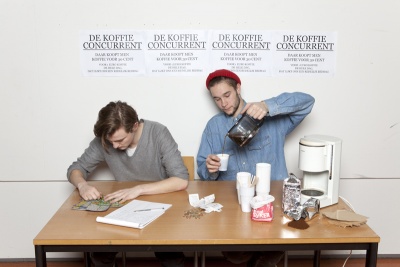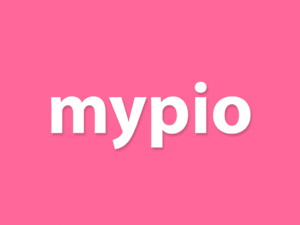User:Roelroscama/creativeIndustries: Difference between revisions
Roelroscama (talk | contribs) (→Mypio) |
Roelroscama (talk | contribs) |
||
| Line 85: | Line 85: | ||
So whether you're an interested investor or an artist looking to go public. | So whether you're an interested investor or an artist looking to go public. | ||
please come by the mypio stand tomorrow during the startupcamp fair for more information and to get a free IPO Quick-Start guide. 10 | please come by the mypio stand tomorrow during the startupcamp fair for more information and to get a free IPO Quick-Start guide. 10 | ||
[http://pzwart3.wdka.hro.nl/~rroscam/mypio/ Mypio Website] | |||
Latest revision as of 10:30, 1 July 2013
Background / De Koffieconcurrent
De koffieconcurrent was a shop that sold very affordable cups of coffee in the hallways of the Willem de Kooning Academy. It's business model was as simple as it was mad: To sell cheap coffee and to buy lottery scratchcards with the proceedings at the end of the day. The potential for insane returns and soaring profits was tempting and seemingly within reach for the duration of the month. After a month of running the Koffieconcurrent we made 24 euros with the sales of coffee. After investing these in scratchcards the balance totalled 22 euros.
The project on www.the-force-of-freedom.com
Lottery as a businessmodel
There seem to be interesting parrallels in:
- artists trying to be discovered through calls, paid entries to competitions etc. Willing to work un(der)paid for long itmes in the hope of fame/money/career - people running tech-startups investing massive amounts of time and resources in the hopes of discovering something to attract venture capital or being being bought-up by technology firms. - gamblers willing to continue playing against the odds in the hopes of striking the one lucky time that justifies all.
Eventhough most participants in these 'lotteries' lose, or do not gain in in a big way, they keep participating. Inspired by the few examples of those that became lucky.
Gamblers betting on games/lotteries often rely on pseudo-rationalization to justify why they of all people will win. Relying on lucky numbers, detecting patterns etc. to give them an edge.
The same goes for start-ups and artists. Rationalizing their marginal existence and low odds of success on pseudo-rational reasoning. "If I do this job un(der)paid now.. I have a chance to get a paid one next time". (Then again this is a very economic way of reasoning and as Hans Abbing suggested, artists defy the laws of economics and value other forms of reward over economic gain.)
As stock markets trading is done increasingly by algorithms and is no longer a traditional trader's job, those who sit on copious amount of money no longer invest in stock. Instead they choose to invest in potentially highly rewarding technology startups. A lottery of sorts in itself, where countless fruitless investments are justified by the one that strikes it big.
Old ideas for artist lotteries
communities of artists collectively invest into one promising artist to launch his career so all take a cut of the profits.
-> all for one, one for all - is it publically traded exchange market? like the AEX where people can buy and sale bonds? Artist Exchange Index - is it a private contract infrastructure? an agreement that a graduating class of art students invests jointly in the career of the most promising one.
Mypio
Salespitch as medium
Hello I'm founder and designer of Mypio. A startup that facilitates personal ipos for graduating artists and designers. 1
When looking at the business model of artists and designers one can conclude it often resembles a lottery. Many are trying to make a living as an artist but there is only a small chance they will succeed. Forcing the majority to work underpaid jobs or sometimes even for free. 2
They have such a small chance because it is a very saturated and competitive market. This creates a situation where the majority will be in bad financial conditions and only a few can make a proper living. We can look at this situation from an investment point of view and put this into technical terms using the CAPM model 3
All are investing large amounts in a risky market but using only a limited portfolio, as they are only investing in themselves. So they naturally end up getting very slight returns and only a few lucky ones get high returns. What needs to happen according to the CAPM-model is that the investment portolios need to be diversified. Investment Portfolios need to represent a market average for a better risk/return ratio. Artists could benefit from investing in each other to spread the investment risks by diversifying their portfolio. For this however artists need IPOs. 4
What is an ipo? It is when a company issues stock. It sells shares that represent a percentage of the ownership of the company. This way a company can attract large amounts of extra money it can use to invest and expand it's business. 5
The shareholders are then entitled an equivalent share of the companies profits. So when the company makes money, investors make money. But the real profit is made by early investors. Those who bought early, when the company had little value and then sold after it has grown. 6
This is where mypio sees a big opportunity for emerging artists and especially classes of graduating art students. Instead of competing against each other they can support each other by collectively investing in the most promising ones amongst themselves. Artists can take advantage of the boost in capital when they do ther IPO. 7
More importantly this way all investors will benefit from the growth of the successful artists. Effectively they will spread their investment portfolio and will have better returns against market average risks. By investing only small amounts in various collegues artists can guard themselves from the arbitraryness of the market. 8
Mypio can facilitate these processes by helping during the ipo trajectory. Helping with the investment prospectus, connecting artists to investors and providing a marketplace for the trade of shares. 9
So whether you're an interested investor or an artist looking to go public. please come by the mypio stand tomorrow during the startupcamp fair for more information and to get a free IPO Quick-Start guide. 10


